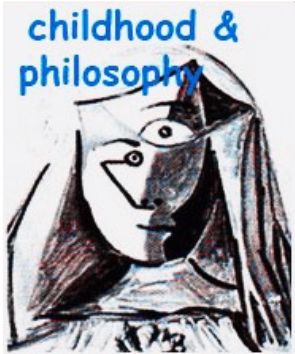urgencia existencial: una provocación a pensar "diferente"
DOI:
https://doi.org/10.12957/childphilo.2023.71997Palabras clave:
Heidegger, Merleau-Ponty, encarnadura, pensamiento, sensibilidad.Resumen
En este ensayo ampliamos la noción de pensamiento haciendo hincapié en la provocación y la urgencia de pensar y reconceptualizando el pensamiento como una práctica encarnada. El objetivo es ampliar el enfoque de Lipman y Sharp sobre la indagación filosófica con niños y mostrar cómo se pueden incluir otras formas de pensar. Nos esforzamos por desplegar una forma de "pensar" que es a la vez diferente de la racionalidad (pensamiento crítico), y diferente del pensamiento creativo y cuidadoso. En la primera parte del artículo, examinamos los méritos del pensamiento crítico, creativo y cuidadoso de Lipman y Sharp dentro de la Comunidad de Investigación Filosófica (CIF). A continuación, ampliamos el método filosófico de Lipman/Sharp a través del Modelo de los Cinco Dedos de Ekkehart Marten, que permite diferentes acercamientos filosóficos. En la segunda mitad del artículo, nos basamos en la obra de Martin Heidegger ¿Qué significa pensar? para desarrollar su concepto de la "llamada" a pensar junto con las nociones relacionadas de provocación y urgencia. A partir de ahí, nos basamos en Maurice Merleau-Ponty para mostrar cómo esta llamada no es una actividad intelectual o un mero ejercicio de la "mente", sino que afecta a toda nuestra existencia. Como tal, el pensar se vuelve una respuesta a una urgencia existencial que es una práctica encarnada. Utilizando conceptos como encarnación, afecto y sensibilidad, intentamos ampliar nuestra concepción del pensamiento en una CIF. Finalmente, esperamos que esto permita a los facilitadores escuchar la voz única de cada niño para que nadie quede sin ser escuchado.Descargas
Citas
Aslanimehr, P. (unpublished manuscript). Exilic Subjectivity.
Carvalho, M. C., & Mendonça, D. (2017). Thinking as a community: reasonableness and emotion. In M. R. Gregory, J. Haynes & K. Murris (Eds.),The Routledge International Handbook of Philosophy of Children (pp. 127-134). Routledge.
Gregory, M., Haynes, J., & Murris, K. (2017). The Routledge International Handbook of Philosophy for Children. Routledge.
Gregory, M. R., & Laverty, M. (2018). In Community of Inquiry with Ann Margaret Sharp: Childhood, Philosophy and Education. Routledge.
Hadot, P. (1999). Wege zur Weisheit. Eichborn.
Haynes, J., & Murris, K. (2021). right under our noses: the postponement of children’s political equality and the now. childhood & philosophy, 17(fev), 1- 21.
Heidegger, M. (1954). Was Heisst Denken? Max Niemeyer Verlag.
Heidegger, M. ([1954]1968). What is Called Thinking? Harper & Row, Publishers.
Heidegger, M. ([1959]1966). Discourse on Thinking. Translated by John M. Anderson & E. Hans Freund. Harper & Row Publishers.
Heidegger, M. (1971). Poetry, Language, Thinking. Translated by Albert Hofstadter. Harper & Row, Publishers.
Heidegger, M. ([1969]1972). On Time and Being. The University of Chicago Press.
Kennedy, D. (2012). Lipman, Dewey, and the Community of Philosophical Inquiry. Education & Culture 28(2), 36-53.
Kennedy, D. (2020). Community of philosophical inquiry and the play of the world. Teaching philosophy, 41, 285-302.
Kennedy, D., & Kohan, W. (2008). Aión, Kairós and Chrónos: Fragments of an Endless Conversation on Childhood, Philosophy and Education, childhood & philosophy, 4(8), 5-22.
Kohan, Walter. (2002). Education, Philosophy And Childhood. Thinking: The Journal of Philosophy for Children, 16(4-11). 10.5840/thinking20021612.
Kohan, W. (2006). Gilles Deleuze: Childhood and becoming-child. childhood & philosophy, 2(3), 11-27.
Kohan, W. (2011). Childhood, education and philosophy: Notes on deterritorialisation. Journal of Philosophy of Education, 45(2), 339-357.
Kohan, W. (2016). Time, Thinking, and the Experience of Philosophy in School. Philosophy of Education Yearbook 2016.
Kohan, W. (2018). Paulo Freire and Philosophy for Children: A Critical Dialogue. Studies in Philosophy and Education, 37, 615-629.
Lipman, M. (1967). What Happens in Art. New York: Appleton Century Crofts.
Lipman, M. ([1993]2003). Thinking in Education. Cambridge University Press.
Louisiana Channel. (2020, November). Sayaka Murata Interview: A Creature In My Own Right [Video]. Youtube. https://youtu.be/GtVYanNYl2Y
Martens, E. (1999). Philosophieren mit Kindern. Reclam.
Martens, E. (2003). Methodik des Ethik- und Philosophieunterrichts. Philosophieren als elementare Kulturtechnik. Siebert.
Mensch, J. (2009). Embodiments: From the Body to the Body Politic. Northwestern University Press.
Merleau-Ponty, M. ([1945]2012). Phenomenology of Perception. Translated by Donald A. Landes. Routledge.
Merleau-Ponty, M. ([1964]1964). Eye and Mind. In J. E. Edie (Ed.), The Primacy of Perception. (C. Dallery, Trans., pp. 159-190). Northwestern UP.
Merleau-Ponty, M. ([1964]1968). The Visible and the Invisible. Translated by Alfonso Lingis. Northwestern University Press.
Rilke, Rainer Maria. ([1923]2000). Duino Elegies (Trans. Snow, E.). North Point Press.
Sharp, A. M. (2014). The other dimension of caring thinking. Journal of Philosophy in Schools, 1(1), 15-21.
Sharp, A. M. (2018). Self-transformation in the community of inquiry. In M. Gregory & M. Laverty (Eds.), In Community of Inquiry with Ann Margaret Sharp (pp. 49-59). Routledge.
Weber, B. (2011). Childhood, Philosophy and Play: Friedrich Schiller and the Interface between Reason, Passion and Sensation. Journal of Philosophy of Education, 45(2), 235-250.
Weber, B. (2013). Vernunft, Mitgefühl und Körperlichkeit: Eine Phänomenologische Rekonstruktion des politischen Raumes [Reason, Empathy and Embodiment: A Phenomenological Reconstruction of Political Space]. Verlag Karl Alber.
Weber, B. (to be published). ‘Another Beginning: On Birth, Childhood, and the Existential State of Being Human’.
Wolf, A. C. (2023, to be published). Affect Theory and Philosophical Inquiry with Children.
Descargas
Publicado
Número
Sección
Licencia
el copyright de cada artículo pertenece a cada autor. childhood & philosophy tiene el derecho a la primera publicación. el permiso de reimprimir cualquier artículo que haya aparecido en la revista necesita de la autorización escrita del autor. en adisión a cualquier forma de reconocimiento requerido por el autor el siguiente aviso debe ser añadido a la declaración de permiso en la reimpresión (con los números apropiados a los puntos suspensivos): [título del artículo] fue publicado originalmente en la infancia y la filosofía, tomo ..., número ..., pp. ...-...




